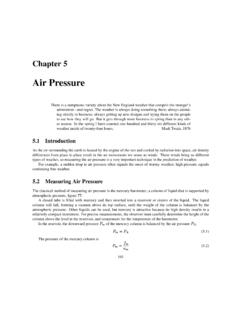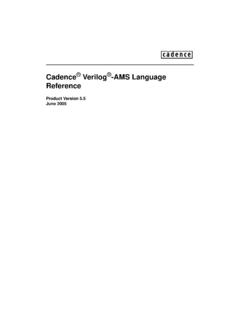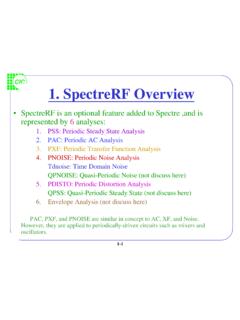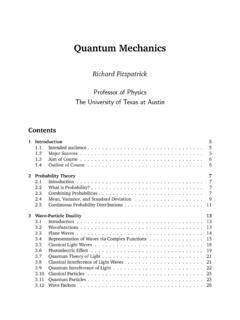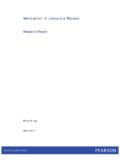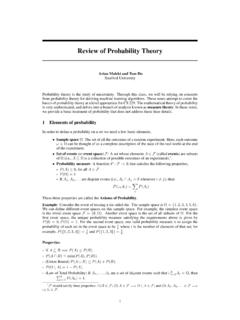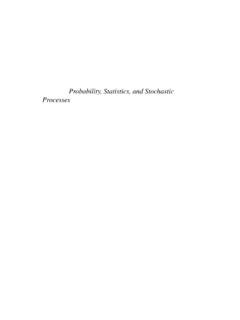Transcription of Recent Developments in Role Theory - Ohio State University
1 Ann. Rev. Social. 1986. 12:67-92 Copyright 1986 by Annual Reviews Inc. All rights reserved Recent Developments IN ROLE Theory B. J. Biddle Center for Research in Social Behavior, University of Missouri-Columbia, Columbia, Missouri 65211 Abstract Role Theory Concerns One of the most important features of social life, characteristic behavior patterns or roles . It explains roles by presuming that persons are members of social positions and hold expectations for their own behaviors and those of other persons. Its vocabulary and concerns are popular among social scientists and practitioners, and role concepts have generated a lot of research. At least five perspectives may be discriminated in Recent work within the field: functional, symbolic interactionist, structural, organizational, and cognitive role Theory .
2 Much of role research reflects practical concerns and derived concepts, and research on four such concepts is reviewed: consensus, conformity, role conflict, and role taking. Recent Developments suggest both centrifugal and integrative forces within the role field. The former reflect differing perspectival commitments of scholars, confusions and disagreements over use of role concepts, and the fact that role Theory is used to analyze various forms of social system. The latter reflect the shared, basic concerns of the field and efforts by role theorists to seek a broad version of the field that will accommodate a wide range of interests. INTRODUCTION Role Theory poses an intriguing dilemma.
3 On the one hand, the concept of role is one of the most popular ideas in the social sciences. At least 10% of all articles currently published in sociological journals use the term role in a technical sense, chapters on role Theory appear in authoritative reviews of social psychology, essay volumes on role Theory appear regularly, endless applica tions of role ideas may be found in basic texts for sociology and social 67 0360-0572/86/0815-0067$ Annu. Rev. Sociol. :67-92. Downloaded from Access provided by Ohio State University Library on 01/04/16. For personal use BIDDLE psychology, and role Theory provides a perspective for discussing or studying many social issues.
4 On the other hand, confusion and malintegration persist in role Theory . Authors continue to differ over definitions for the role concept, over assumptions they make about roles , and over explanations for role phe nomena. And formal derivations for role propositions have been hard to find. This dilemma has prompted some authors to write damning reviews of role Theory . Nevertheless, substantial reasons exist for the popularity of the role concept. Role Theory exhibits an agreed-upon set of core ideas, and empirical research that uses these ideas flowers. The philosophical stance of role Theory is attractive and useful in efforts to ameliorate human problems.
5 Role Theory offers opportunities to integrate key interests of researchers in sociology, psychology, and anthropology. Recent contributions also suggest that explana tion in role Theory is now becoming more formal. Consequently, the focus of this essay is more upon synthesis than criticism of the field. I review ideas basic to role Theory , examine treatment of these ideas in several perspectives of social thought, and review empirical research for key issues in role Theory . The essay ends with a discussion of issues and propositional Theory for the field. BASIC IDEAS AND ORIENTATION Role Theory concerns one of the most important characteristics of social be havior-the fact that human beings behave in ways that are different and predictable depending on their respective social identities and the situation.
6 As the term role suggests, the Theory began life as a theatrical metaphor. If performances in the theater were differentiated and predictable because actors were constrained to perform "parts" for which "scripts" were written, then it seemed reasonable to believe that social behaviors in other contexts were also associated with parts and scripts understood by social actors. Thus, role Theory may be said to concern itself with a triad of concepts: patterned and characteris tic social behaviors, parts or identities that are assumed by social participants, and scripts or expectations for behavior that are understood by all and adhered to by performers.
7 Confusion entered role Theory because its basic theatrical metaphor was applied only loosely and because its earliest proponents (Georg Simmel, George Herbert Mead, Ralph Linton, and Jacob Moreno) differed in the ways they used role terms. Unfortunately, these differences persist in current litera ture. Thus, whereas some authors use the term role to refer to characteristic behaviors (Biddle 1979, Burt 1982), others use it to designate social parts to be played (Winship & Mandel 1983 ), and still others offer definitions that focus on scripts for social conduct (Bates & Harvey 1975, Zurcher 1983). Although these differences appear substantial, the problem is more terminological than substantive.
8 Agreement persists among role theorists that the basic concerns of Annu. Rev. Sociol. :67-92. Downloaded from Access provided by Ohio State University Library on 01/04/16. For personal use IN ROLE Theory 69 the orientation are with characteristic behaviors, parts to be played, and scripts for behavior. For convenience, in this essay I shall designate these basic concepts of role Theory by the familiar terms of role, social position, and expectation, respectively. Somewhat more serious are disagreements by role theorists over the modality of expectations presumably responsible for roles . Whereas many role theorists assume that expectations are norms (Le.)
9 Prescriptive in nature), others assume them to be beliefs (referring to subjective probability), and still others view them as preferences (or "attitudes"). Each mode of expectation generates roles for somewhat different reasons, so different versions of role Theory result, depending on the mode of expectation assumed. (Later I will argue that all three modes should be retained.) Even more serious is the retention, in role Theory , of concepts whose definitions involve improbable, undetectable, or contradictory conditions. To illustrate this latter problem, one influential source defines a role as "a particu lar set of norms that is organized about a function" (Bates & Harvey 1975 : 106).
10 Another describes role as a "comprehensive pattern for behavior and attitude" (Turner 1979: 124). And still another conceives role as "behavior referring to normative expectations associated with a position in a social system" (Allen & van de Vliert 1984a: 3). These definitions overlap, but each adds one or more conditions not given in the others. This leaves the reader in confusion over how to conceptualize or study events that do not meet these conditions. (Are patterned behaviors then not roles when they are not associated with a function, not tied to attitudes, or not associated with norms or social positions?) Role Theory would be better off if its major proponents could be persuaded to agree upon, or better yet, to eschew, such limiting conditions.
